|

Frozen remnant of autumn.
(*photo credit)
February 1, 2013 A Moment in the History of the Church
We need a sense of history, and this holds true for patriotic citizens as well as for participating Church members. In fact, all ought to be proud of our Church history with all her grandeur and her blemishes. In this "Year of Faith" we are encouraged to learn and champion our history, for glory shines through clouds. In a longer view, Christ's promise to be with his Church until the end of time is being faithfully kept down through the centuries. None of us are perfect contributors to that ongoing history, but in the mantel of God's mercy we carry on.
Study history -- We challenge all to learn from our Christian history, for its moments of glory help us endure troubled times. Quite often the closed-mindedness of warring parties ought to be demonstrated so we become aware of where we stand on issues. Throughout history, movements must be seen in their context and how they resulted in benefits or harm to various parties. Persecutions occurred from outside or within, conversions, festivities, cultural expressions, and important leaders came and went.
Refute misconceptions -- Quite often people, with hardly a remembrance of what happened four years ago, will be mesmerized by sketchy information and an accumulation of distortions; they may even consider themselves as knowledgeable of history. Those proponents or enemies of the Church allow themselves to be caught up on the remarks of ill-educated folks with only scraps of past understanding. Duped by the duped becomes a contagion that affects our world with its limited attention span to detail. Knowledge of Church history permits us to offer solid advice when needed.
Towards a new evangelization -- We are encouraged to speak up for our faith, to find an opening when we can defend truths we hold dear. We ought to be driven to go beyond glib conversational remarks that have little or no depth to a deeper discussion of what is so needed to acquire a good moral and ethical stand. Often, those who have left the Church have unaddressed issues that could be met if an opportunity affords itself and we discover and avail ourselves at this opportunity. The seriousness of response by an ongoing student of history is an opening to talk.
Ramifications of a study of Church History extend far towards healing a troubled Earth. As mentioned elsewhere, Earthhealers need to be thorough, balanced, spiritually directed, and quite serious about environmental issues at hand. A study of Church History makes us aware of practices that we take for granted. Maybe the phrase "It is Global Warming stupid" extends beyond an election year and also applies to "It is history...."
Reference: The Catholic Church: A History, 36 lectures on DVD by William R. Cook, The Teaching Company, 2009.
Prayer: Lord, give us energy to learn from our past, to speak publicly in the present, and to help establish the future Kingdom
of God.

Taking a break.
(*Photo by Warren Brunner - click for info)
February 2, 2013 Delightful Sights in Winter
On Groundhog Day, when little varmints we consider observant peep out to surmise the weather, we can resolve once more to be watchful as we search the landscape for late winter life. Let's not neglect to inspect dens, trees, thickets, and barnyards, for companion animals tell us how they endure wintry blasts and stay balanced and alert. We fixate on modern electronic devices and TV images of distant places, and isolate ourselves when we ought to look outside of our den and see if we see our shadow. We endure the darkness when we ought to proclaim the strengthening light; we curse darkness when we ought to see light beyond the horizon.
Other creatures endure the winter without complaining, and they live in resigned contentment. We have to count our blessings; we have survived and right now are free of a host of communicable diseases that spread in wintertime. If we are blessed with physical eyesight, we are able to look about: evergreens sway in the breeze, shaggy-coated livestock are huddled, kids scamper about when weather permits, naked trees have their beauty, and the sky is still blue. We have much to be thankful for being alive in February. We can be confident that this is a grace-given moment in our lives. From our book Appalachian Sensations: A Journey through the Season we offer this excerpt:
February -- Farm Animals in a Barnyard
Mountains and hills,
orchards and forests,
wild animals and farm animals,
snakes and birds,....
Let them all praise the name of YHWH.
(Psalm 148:9-10, 13a)
All God's creatures give praise. That includes animals wild
and tame. Farm animals are not just for human gain in meat, milk,
eggs, and wool. These animals are here to accompany us on our
way, and are praiseworthy in what they are and are able to offer us. The sight of herds of sheep or goats or cows draws us to contentment and peace. Do we users of animal products remember the sacrifice our livestock make to furnish us a better quality of life? Some purists regard these animal sacrifices as too demanding, and refrain from eating meat or milk products or even wearing leather. We all need to heed a basic Christian message: treat all life with respect. Like Christ, we are willing to serve plants and animals as well as fellow human beings; we are to maintain and enhance all of life? We are all strangers and guests on this planet and we need to make it a home together.
-----------------------
Prayer: Lord, keep us watchful and alert at all times and seasons; allow us to learn from the wildlife and domesticated
animals how to endure unpleasant conditions.
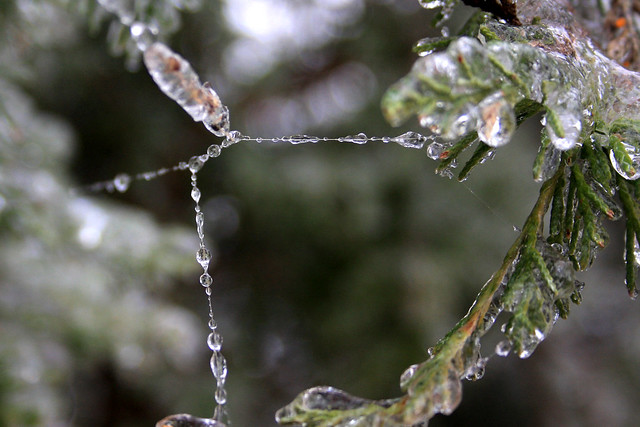
Delicate jewels made of ice. Kentucky ice storm, 2009.
(*photo credit)
February 3, 2013 Prophets Must Speak the Truth
I tell you solemnly, no prophet is ever accepted in his own country. (Luke 4:24)
In today's Gospel passage, Jesus launches his public ministry by speaking plainly and forthrightly about his universal message. It is a difficult undertaking for it occurs in his hometown and his message is received with mixed emotions. In telling about the universality of his concerns, and quoting from Scripture to do so, Jesus triggers rage on the part of hometown acquaintances. Some issues seem beyond the pale of political correctness, but ought they? Several inconvenient truths require public expression today:
1. Climate change is of human causation and needs to be immediately addressed by all. Even if this causes the rupture of a delicate balance at a community level by some who cannot dare to accept this truth, still we need to change our lifestyles at the personal and higher levels and do so NOW. Part of the immediate change needed is to choose only renewable energy sources.
2. The globalized capitalistic economy is utterly unsustainable; it must be changed though this is a slow process, for what will ultimately emerge is currently unknown. The time for tweaking and modifications is long past by both privileged wealthy nations and individuals; a nightmare is emerging called fiscal gridlock. The wealthy, whether nations or individuals, must share the immense resources they have sequestered with those who need the essentials of life: nutritious food, clean drinking water, adequate housing, quality education, and access to health facilities. Unfortunately, those in favor of redistribution, especially through fairer taxation, will expect severe limits on implementation because of "hometown" rage and opposition.
3. Religious freedom always deserves protection. This message is generally more difficult for those who accept the first statement totally and the second with some degree of qualification. Social issues often clash violently during the current cultural wars over same-sex marriage and abortion. Here the freedom of individuals, communities, and institutions to practice what is ethically important requires defense. No one ought to be bound to follow rules that they regard as immoral -- and they have a perfect right to help render them inoperative. The first American Revolution was triggered by being upset with lack of freedom. Let us never forget things are worth fighting for in this age as well.
4. Guns or at least their ammunition must be controlled. The ban on automatic weapons needs to be reimposed and enforced. We are in a land sprinkled with crazies who regard it their right to bear arms and have a cache of ammo to use at will. The right to bear arms needs to be a civic and community duty as it was in 1775.
Prayer: Lord, teach us to hear the Spirit and, even when
truths seem hard to express, help us do so at whatever cost.

The peanut plant.
(*Photo by Rae Allen, Creative Commons.)
February 4, 2013 365 Foods Containing Peanuts
We have waited one month before inserting this as a reflection because last year's attempt at use of vinegar in many ways had to be halted -- too acidic! Peanuts are a better possibility in the tradition of our 365 soups (2009), 365 salads (2010), and 365 uses of oatmeal (2011). Note that George Washington Carver developed 300 uses for peanuts a century ago, so is it that hard? Recall that the goal is to demonstrate immense variety with economy foods.
This "peanuts-in-foods year" is combined with the positive ecological characteristics of the leguminous peanut plant (Arachis hypogaea): soil improvement; fruit-bearing underground and not on trees susceptible to storm damage; and ease in harvest with high yields per acre. Here is an intensive crop that is also proteinous and takes less land in contrast to many types of meat production. The peanut contains antioxidants and is regarded as a wonderfully balanced food. See reflection on January 19, 2012.
Roasted peanuts are a favorite American snack. Peanuts can be eaten by themselves or in combination with popcorn, mixed nuts, and sugary ingredients to act as snack foods and trail mixes. Peanuts are found in cakes, ice cream, a wide assortment of candies, custards, and other desserts. We also know that peanuts are tasty additions to fresh salads when sprinkled over them as a topping. Peanuts have been added along with fruit and mixed nuts for both cold and hot cereals, a welcome addition to breakfasts.
Peanut butter, that happy American invention, is a favorite of youngsters with jelly of various types and tastes. However, the ways are numerous to add a dash of peanut butter to fresh vegetables and fruits with various degrees of success. We included some of these in the Salad year but the way is open to include less familiar veggies such as leeks, kohlrabi, and Japanese radishes.
Peanuts and peanut oil can be found in numerous dishes from other lands. Soups and cooked dishes with peanuts had hardly been tried beyond inserting with oatmeal in scrambled eggs (see 365 Oatmeal Uses). Africans have many peanut dishes that are fried or boiled, but these await testing for convenience and satisfaction. I have never used peanut oil and will find this a challenge in the coming months. Peanut oil and other ingredients have been added to ice cream, peanut milk, and various other commercial materials --provided ingredients are listed and all customers are alerted.
Note: About one to two percent of people are severely allergic to peanuts and can go into shock and constricted breathing if unknowingly subjected to peanut products. We sympathize with them, respect their plight, and caution all who suffer from such maladies (and their caregivers) to examine food labels. Many but not all peanut allergies can be treated.
Prayer: Lord, teach us to use the good things of life and to
discover those that are nutritious and satisfying.
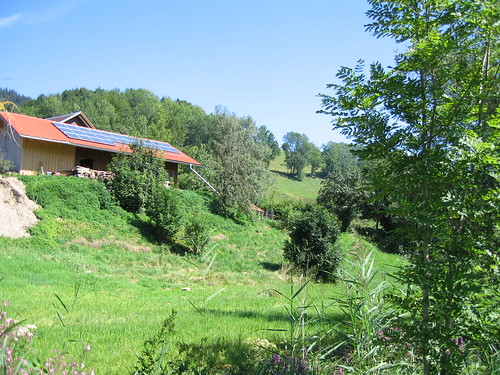
Solar-powered farm home.
(*Photo by B. Ristley, Creative Commons.)
February 5, 2013 Twelve Reasons to Emphasize Solar Energy
The environmental consideration for this month is solar energy applications. Days are getting longer, and we experience the warming rays of daylight as we pass winter's mid-point.
1. Ecological reason. Solar utilization emits no carbon dioxide or methane. Currently, the global greenhouse gas index continues to rise, and is rapidly reaching the point when renewables must help allay major damage from greenhouse effects.
2. Investment friendly. The solar source comes free of charge. To capture, store, and utilize solar energy takes some investment, but the payback is reduced by eliminated electric bills and some solar energy can be returned to the common electricity pool through intertied systems.
3. Solar potential is highly dispersed. The American South and Southwest have higher potential for application, but all parts of the country are suited for many solar applications.
4. Environmentally benign. No renewable energy is perfect but solar is far more friendly than non-renewable sources and production. Solar fits the bill as one of the best ways to reduce global warming and help save the planet, and in coming years the application prices will decline still further.
5. Safety. All energy sources can be misused but some are far more problematic than others. Treating solar photovoltaics with respect will mean no accidents will occur. Replacing nuclear power plants with solar and wind energy could reduce risks of nuclear damage from an earthquake, tsunami or terrorist attack.
6. Economics. Solar energy panels are dropping dramatically in prices in the past few years and are destined to become cost competitive in a matter of a few years. Certain solar coatings for roofs will mean a vast increase in use is expected. Taxpayers bear non-renewable hidden environmental costs and high subsidies that if applied to solar energy would hasten its competitive position.
7. Ease of start up. Solar, like windpower, takes less time from construction to start-up (one or two years instead of nearly a decade for a nuclear plant).
8. Proven tradition. Solar energy has been used in certain applications such as clothes drying, water heating, and warming of interiors for centuries by many cultures.
9. Job possibilities. An immense potential for jobs creation exists (some 300,000 new jobs have been created in the last three years and more are on the way).
10. Energy independence. Solar is not the total answer but it is part of a balanced solution for it can effectively contribute to a renewable energy mix that is coming in the future. Solar helps ensure security from risky foreign oil sources.
11. Consumer satisfaction. People are drawn to solar energy just as moths are drawn to light. This natural affinity for sunlight translates into welcoming solar energy into the home.
12. Homesteading process. Solar can be used in domestic and small business applications independently from a broader system.
Prayer: Lord, help us to become more bonded to brother sun.

A moment of reflection along a quiet woods trail.
(*photo credit)
February 6, 2013 Maintaining Mental Balance in Various Ways
February can be a dispiriting time for those of us who are indoors too long and crave the refreshing effects of outdoor springtime activity. February demands mental agility as well as physical exercise. Let's hope some of the following seven general suggestions will help:
Keep busy. Through the ages they tell us that "an idle mind is a Devil's workshop." Staying busy in mind may not be hard for a daydreamer, but it can be trying for average people enduring the latter half of winter. One suggestion is to prepare your day by listing things that must be done and those that could be added if time allows.
Champion creativity. Some like recipes, specific menus, favorite songs and music, old card games, commercial puzzles, and tried and true soap operas or TV shows. However, a more creative February calls us to make a new soup (perhaps using leftovers by adding fresh ingredients), invent games, create your own song or music, try a new radio or TV station or media outlet, or invent your own puzzles worth solving.
Read a saint for the day. There are hundreds of them, in fact, so many to choose from that the sheer number is breathtaking. Google one on the Internet or buy a book with saints listed. Two weeks from today we will list eight to ten saints for every century, showing the holiness that was never relinquished throughout the two millennia when Christ first promised to be with us always. Saints will raise our spirits when introduced into their company.
Launch into a new project. I hesitate on this suggestion because many of us have too many random activities, and we fail to finish those we resolved to do earlier.
Play interactive games. This is a standard way to stay mentally occupied. I was never drawn to chess or bridge or other such intellectual occupations and must even concede that a younger and savvier Internet gaming crowd does have beneficial pursuits. Some even make a living in playing computer games -- and that certainly beats fuel-wasting "joy-rides" of a former generation of which I was part.
Contact a friend. Is it wrong to tell another that you need uplifting? It might even make them feel needed. Some people retain a sense of humor even in difficult times -- and they are the ones to contact. Distant communication is so much easier today than in the past -- phone, email, and postal means. Praying for another is a form of communication as well. Connecting with them for no apparent reason can "make their day" and yours as well.
Rearrange records. Putting our house in order is always a way of discovering a lost record. Chances are quite high you will rediscover a long lost record and bring back of flood of good memories. That final look at a program or information sheet will serve its purpose even when you recycle it in the paper bin.
Prayer: Lord, give us the opportunity to regard our mental
state as a true gift, and help us act to preserve it all the more.

The mourning dove, Zenaida macroura.
(*Photo by Alexanda MacKenziem Creative Commons.)
February 7, 2013 Enchanting Soundscape of February
This is winter, and sounds carry farther and more distinctively without the dampening foliage of summer that will appear again in about two months. This was first drafted immediately after the last leaves fell. For the first time in months I could hear distinctly the rock crusher in the distant mountain quarry. In leafless times we hear shrill whistles of the passing train, roar of traffic noise in the distance, or planes overhead. We listen to recorded music or see a movie during this otherwise dry month. Let's make the best of winter "soundscape."
Really, human-generated sounds take second place to the sounds of nature -- the trickling unfrozen creek (think back to January's water sounds), the rustle of the ground squirrel impatient for spring, or the hearty winter bird residents hunting for a meal. We turn to the last of these, for they are able to give us some music in a season of general silence, whether the caw of the distant crow in the winter morn, or the hoot owl on a cold winter night. We focused on one such winter bird in our texts associated with Appalachian Sensations: A Journey through the Seasons:
February -- The Mourning Dove: Spring's Harbinger
The season of glad songs has come,
the cooing of the turtledove is heard
in our land.
(The Song of Songs 2:12b)
A characteristic Appalachian sound, coming somewhat early in
the year, calls to the depth of our collective souls. It is the sound of the mourning dove, our commonest species in America (Zenaida macroura). The cooing we hear distinctly in February is the harbinger of spring, for when it starts we know the earth is awakening, the sap is quietly rising, and the tree buds are swelling ever so minutely. We come to love the peaceful dove's sound. These birds call us from winter's slumber to start again to come alive, to cultivate the land, and to bring God's blessings to full bloom through the work of our hands. The humble dove gives the first soft sounds, but if we listen we hear their soft-spoken message, for from February emerges a growing expectancy of spring.
We impatient folks despise cabin fever. Will winter ever end? Perhaps so, if we attune our senses to subtle sounds of change. In Lent's somber modes, let us listen to sounds like the mourning dove's cooing. Nature and its creatures are marvelous teachers, if we are patient enough to listen.
----------------------------
Prayer: Lord, open our ears that we may hear you speak to us in the silence of our heart. Help us break the sound barriers that keep us engrossed in busy din and meaningless chatter.
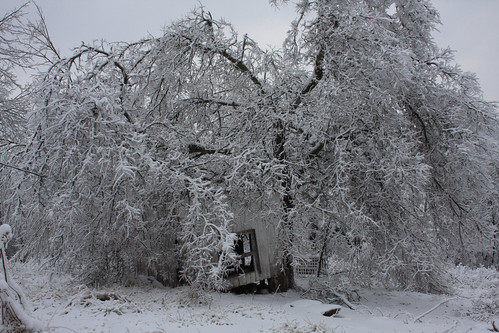
Branches heavy with February snow. Laurel Co., KY.
(*photo credit)
February 8, 2013 Scouting and Enjoying Nature's Benefits
On this Boy Scouts' Day let's be inclusive and include the girl scouts as well. The scouting program was good in my youth and still is; it is an opportunity to encourage outdoor camping and practical skills that allow people to enjoy nature with all its roughness and benefits, and cultivate a spirit of self-reliance. Youth begin to realize that we can thrive amid uncomfortable weather conditions and supply shortages. Insects can be worrisome but can be endured as can wind, rain, and sun.
Camping experience -- My first encounter with cool weather camping was within our parish scout troop. I vividly recall removing leaves below the tent and then enduring the chill of cold earth through the night. I learned from this experience that we leave leaves on as insulation and comfort, after taking pains to remove any twigs and stones. This all seems to outdoor camping professionals as elementary, but it had not been emphasized prior to our first outing. We learn some things the hard way -- but in the many years since, when I have camped in all but three of our United States, the preparation of a tent site becomes a major ritual that harks back to that scouting experience.
Acquaintance with nature -- Acquired skills have long-lasting effects and make youth into practical adults who can build campfires, learn not to fear the sounds of outdoor life during the night, and enjoy nature with expected discomforts. Amazingly, if not removed, discomforts or lack of skills stay with people and limit enjoyment of the mystical experience of woods and wildscape.
Practical skills -- Those most skilled in practical matters have the opportunity to enjoy nature more. I tie a knot that must hold and realize that the wrong loop was explained in scouting. Practicality learnt early saves us from painful experiences later in life. Impractical folks defer to others and try to hide their lack of basic skills, somewhat like many illiterate people do. We recall that Jesus gets into a boat that pulled away from the crowds so he can address them all meaningfully. Jesus is practical; he tells us to acquire the cleverness of shrewd stewards of resources while still not necessarily imitating their moral failings.
Joining forces -- A team enjoys nature more than do most lone venturers. Scouting starts youth on a road to socialization with many benefits during life. Working together as a troop on projects has the advantages of teamwork also discovered in various athletics involving cooperative interaction. Earthhealing is one such joint venture, and past skills are a wonderful preparation. Scouting can be the beginning of team-building and interacting with common goals in mind. If a troop can accomplish something together, so can a global community. Let's support scouting at this time for it is a great way of getting young people outdoors.
Prayer: Lord, give our boy and girl scouts the stamina to stay in programs and to acquire practical skills for life.

Rural Kentucky farm scene, at sunset.
(*photo credit)
February 9, 2013 Earthhealers and a New Evangelization?
Everything that the Church is and does only acquires its full meaning when it becomes a witness. Pope Benedict XVI
The question posed for this reflection does not mean that the content of the Good News has changed, for it certainly has not. The method of bearing witness to content has not changed either. What is new is the urgency of place (HERE a troubled world) and time (NOW as an opportunity to act); furthermore, the need is to enlist all people for the tasks at hand, for they are bigger than what we can do as lone rangers (WE must work together). To throw up our hands and give up is to isolate ourselves from a world in need; to say the work ought to be postponed because we are not yet ready is to evade the issue; to think that we can do this alone is to miss the demands for teamwork and joint operations.
Witnesses are called to a different set of hearers; urgency comes at a new time and place, though urgency is really no more than when Jesus said the time was right for action. We find in our following of Jesus that to be a witness to his mission is to imitate him in many ways -- in extending love to all and mercy especially to those in greater need. The change is that the times and places are different today than two thousand years ago and a global vista is more apparent today. Crowds are different and the cooperating teamwork demands respecting cultural differences.
Technologies are certainly changed in the past two millennia, and so the voice of one calling in the wilderness is now done from the vantage point of radio waves and the media of TV and Internet. The witnesses announce an old and tested message that is of God's incarnate word being spoken in our midst. We have means of expanding our efforts beyond our voice range to a wider global audience -- and this deepens our responsibility. The world is out there with many people, but we have good means to travel to them and to address them. We act with limited but powerful resources.
Joyful witnesses are needed once more in a world of misery. We attempt to keep our cool, retain our sense of humor, and to cultivate our good will. In place of foreboding doom must be one of joy and hopefulness; at a time of dire predictions and terrorist threats is substituted that of joyful promise and opportunity; in the temptation to retreat into the isolation of self, we discover and proclaim the possibility of selfless working together for a better world where justice will prevail. Somber Lent comes with a hidden joyful sense, for the culture of death is overcome by life, despair by hope, and isolation by promise of global sharing.
Reference: What is the New Evangelization? Michelle K. Borras, Catholic Information Service, Knights of Columbus.
Prayer: Lord, inspire us all to be witnesses with an impelling urge to spread the Good News at this time to a troubled world; give us the courage we need along with a sense of empowerment coming through trust in you.
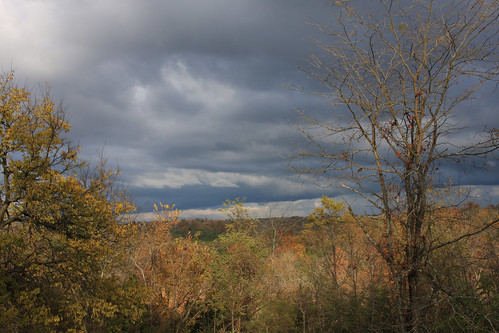
Mix of sun and clouds, making of a winter sky.
(*photo credit)
February 10, 2013 Called to Be and Find Earthhealers
I answered, "Here I am, send me." (Isaiah 6:8)
The Gospel passage (Luke 5:1-11) tells of the disciples pulling out into the deep with their fishing boats and at Jesus' direction casting their nets into the sea. After a night of fruitless fishing, they were overwhelmed with an abundant catch at his direction. Then Jesus invites them to turn their harvesting skills to catch people rather than fish. These fishermen left their nets and followed Jesus.
The story of following a calling seems simple at first and yet we are all to familiar with backsliding and excuses that do occur. Invitations to a noble calling seem so easy but times can get rough, so we must be realistic in being called and in extending the call to others. Our sense of realism must accompany the calling, for often Jesus tells his disciples about persecutions.
The caller needs the faith to endure difficulties. Many hold back from the calling to be healers of the Earth because there is little remuneration and action is counter to a prevailing culture all around us. We are not Jesus, nor have the force of his character. From our part we must show sincerity in the calling and honesty in how we have responded to it in our unpolished manner. Our record is not perfect and that dulls the message to some degree. However, our effort at improvement can be seen as worthy of the caller. We cannot compromise on truth; the caller must be prophetic and accept risks and do so with joy.
The recipient soon recognizes the nobility of the calling and, like Peter, asks Jesus to depart because he (Peter) is a sinful man. Peter here realizes his unworthiness and his need for improvement. Scriptures show Peter's denial of Jesus at the moment of greatest importance on Good Friday. However, God still calls him after the Resurrection; Peter grows into his ministry as head of the apostles. Healers learn about the length of process to experience and responsibility involves both care of self through personal improvement and service to others. Self improvement is humble recognition of limitations.
The healing process has that dual component, namely, simplification of lifestyle by the healer, and a call to service in facing a troubled Earth. The two demand ambivalence -- growing in perfection while helping others do the same. Healing is an all engrossing process and some who have attempted to be such leaders in the past may be distracted by tempting high salaries, wealthy friends, offered perks, and cushy residences. However, those who seek to be more influential healers know the value of simplicity. So-called "privileges of the leader" is out of the question, for a new economics demands leaders with balanced interior ecology.
Prayer: Lord, teach us to be responsible healers, welcoming
interior change as a sincere and powerful part of healing others.

Sunflower's head, food for winter birds.
(*photo credit)
February 11, 2013 The Taste of Sweet Things in February
Just before Lent many attempt to stoke up on favorite sweets and then to fast from them during the solemn season -- or at least that was our procedure when youngsters. We abstained from candy during Lent and awaited Holy Saturday. Such was the life of youth and also adults who still retain a sound sweet tooth.
In simpler times the sweetness was supplied from natural sweeteners. White sugar now found in so many of our commercial processed foods and baked goods was absent. Many of us have participated in gathering honey and in making sorghum, both favorites of Appalachian people, both choice sweeteners. Other folks, especially in the northern portion of the region, participate in making maple syrup at this time of year. The maple and other tree sap is rising, and this is gathered and boiled down to make the golden syrup that so many prize on pancakes and other delights. Allow us once more to insert our contribution to Appalachian Sensations: A Journey through the Seasons for this month.
February -- The Glory of Sweet Things
All creatures depend on you
to feed them throughout the year;
you provide the food they eat,
with generous hand you satisfy their hunger.
(Psalm 104:27-28)
Tree sap is rising, a sign of new life in the early year. And some of that immense quantity of sap is tapped, because it is filled with nutrients and can be cooked into a favorite sweetening agent. Maple sap is boiled down to a tasty amber syrup prized by many. This precious liquid does not come free, for it takes human labor to tap maple trees, which are still plentiful in our region, and then to haul collected sap to cookers, who stoke the fires just so much, skim the boiling liquid, and collect the boiled-down, end product. What results of all this expertise and loving effort is authentic maple syrup; it is more costly of course but far superior to imitation products made from corn. Through human efforts, the goodness of the Divine Provider is fully realized, like our offering to God of precious things given and refashioned by our helping hands. It takes energy to help save a troubled world but our work can have a sweetening effect.
-------------------
Prayer: Lord, hone our tastes for the better things of life; however, leave us with enough taste buds to enjoy nature's sweeter gifts that you have blessed us with. Give us a combination of physical and spiritual tastes, so that we may better spread the Good News with ease and good teeth.
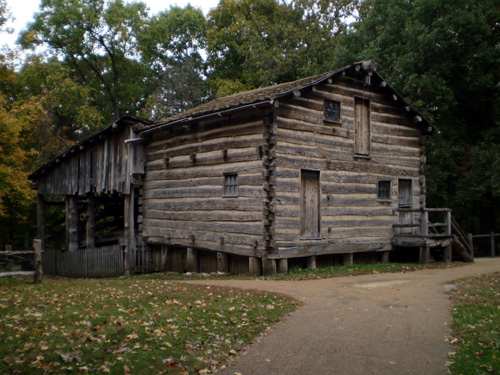
Scenes from Abraham Lincoln's New Salem
(*Photo by Mark Spencer)
February 12, 2013 Lincoln: A Heroic Figure When We Need Heroes
The mystic chords of memory will yet swell the chorus of the Union, when again touched, as surely they will be, by the better angels of our nature. President Lincoln
One more time Lincoln's Birthday allows us to consider this authentic American president when a popular movie about a major decision of his is at the box office. People, especially youth, need models to whom they can look up to for leadership and as exemplars in life. No one is perfect, and so we may be frank about lives and yet highlight the good points when possible. Lincoln is a most beloved president who best fits this mold. He became president at the most critical time in American history -- a nation was falling apart and eleven states seceded between his election and when he took office in March, 1861. In order to preserve this crumbling union the demand was for a person of immense courage.
Lincoln was courageous from the start. The contrast can be made with that of his predecessor, James Buchanan, who wilted at the prospect of the dissolving union and was unable to act decisively in that critical period. Lincoln listened to the sometimes unwise council of others who would have capitulated to Confederate demands. With a nerve of steel, the new president proceeded to conduct the affairs of state in such a manner that it caused the South to fire the first shot. His was a reaction to a provocation, even though others said to abandon Fort Sumter.
Lincoln was energetic but cool. Lincoln assembled a cabinet of natural leaders but strong egos; he risked having this group for it would precipitate hot discussion on critical issues. However, he desired to hear from them and as a leader he did not allow them to walk over him as some thought they could do to this Midwestern "rural bumpkin." He was always ahead of them even while listening to their arguments; he picked and chose from what they said. Lincoln never panicked even though times could have expected it.
Lincoln was hopeful. Not only would the union be preserved but that great dividing knife of slavery would be done away with through proper legal procedure. His hope was that a people could be one and equal and that it could be established in such a manner that the entire nation would prosper. In the longer run, Lincoln began to see that this land could not exist half-slave and half-free, and this emerging insight of his was a prescience to help overcome the global disparity of wealth that we have today.
Lincoln was merciful. Lincoln realized that healing a wounded nation requires forgiveness and integration of recent rebels back into the national fabric. Had he lived, Lincoln would have directed reconstruction with a greater sense of generosity than was the actual case. Amid acrimony and impeachment proceedings of Andrew Johnson, his successor, progress did occur but painfully so.
Prayer: Lord, help all discover heroes and benefit from them.
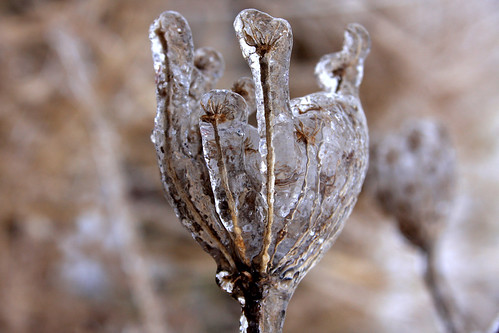
Kentucky Ice Storm, 2009.
(*photo credit)
February 13, 2013 Making Our Lent a New Opportunity
Let's focus on this Ash Wednesday on the second title word of this Reflection: "Our." Lent is to be part of our collective endeavor that includes reaching out to non-practicing Christians as well as the practicing faithful. We come to receive ashes and know that this is the time for "our" collective and individual response. The temptation is to put reform off and thus make Lent distant. This hour is for us to act, the "Our." We are to make the time of Lent present in our lives, not accepting time as something statically possessed but an opportune time for salvation. God gives us time to use wisely, and Lent is such a time. Today, we recall that all too soon our mortal bodies will return to ashes.
Opportunities are precious temporal space in which benefits can outnumber barriers and, by trusting in God, obstacles can melt away. Lent is the right occasion if we only look up and see it. If we are vigilant (a perpetual and not a seasonal virtue), we discover beneficial occasions for change that are unpredictable as to a final outcome, but are the content of our hope as Christians. We certainly can make specific plans as to particular changes, but this season contains the freshness of coming spring, the openness to the Spirit who is willing to fill our lives with new possibility. Being vigilant means being open not only to what is done to us, but also for what we do for and with others.
"Our" means that we are to accept opportune time in and among a community of believers. Lent is not just for others, but rather is for all of us. Let's make this Lent a joint venture rather than either abandoning it to those others we think need it, or see Lent as a private devotion period for some personal modifications apart from others. Let's consider Lent as a joint undertaking with others and do this within a parish or community context. The reinforcement that comes with doing things together helps each of us to be resolute in achieving our collective goal.
Personally, I must resolve to make Lent a moment to choose. This is all the more reason for being willing to put aside the ruts of allurements that tie me down, and see this opportunity to arise by God's grace to deeper personal and social awareness that incorporates the WE into my personal life. Within me, individual choice and social dimension must come together.
Balancing social justice and individual choices is the challenge of this Lent. America must overcome the singular "I choice" (consumer with selfish demands) that is clearly divorced from the "commons" with its joint responsibility and desire to radically share with others. If we do not promote the two together we are left as selfish individuals. Part of the battle over lifestyle choices and pro-life failures is failure to see the OUR dimension in every choice. Together we move to salvation.
Prayer: Lord, help all of us overcome our reluctance to look
out for the collective needs of all during this Lenten season.

Love of a devoted friend on Valentine's Day.
(*photo credit)
February 14, 2013 Being Neighborly and Martin Buber's I and Thou
When two people relate to each other authentically and humanly, God is the electricity that surges between them.
Martin Buber
On Valentine's Day, our thoughts turn to a special love we have for others. We recall again St. John's words telling us that God is love. Buber puts that love of God in terms of electricity and there is some truth in that for it takes love to bring about all human bonding. In philosophy class over a half century ago, we read the rather influential book by Martin Buber, I and Thou, and it was highly regarded as a reaction to years of war and hatred.
We do not use that term "thou" except in Shakespeare plays and certain older prayers of rather archaic texts. In fact, an effort to verbalize the familiar may actually be distantly formal in today's world of ever-changing language. However, we need closer relationships in a world of biases, stereotypes, and other ill-fitting categories. The I-thou relationship is one of love in a humane way, a growing together with others through authentic interaction first on a one-to-one basis and then gradually as through a ripple effect outward to the rest of the world. Institutions in community building should cherish this love.
We do not deny our everyday treatment of others beyond the targets of valentines, that is the people we treat in an "I-It" relationship. This involves the impersonal manner of transacting business. We hardly look up when someone waits on us or even if we hold the door for an elderly person. Eye never meets eye and the business of living goes on. In some way we need I-it relations so as to function with ease, but it can be really overdone in the quick-living circumstances of life. I wonder whether the "junk mail" I empty each day contains amid the vast array of garbage some needing soul just looking for a new I-thou relationship.
A third set of relations is the "eternal thou" with our God, a relationship we seek to enter with an all loving Creator who invites our entire love in return. This is a mystical union with our God, and really is the goal of our joining in intimate conversation with our neighbor and while knowing God's presence. 0
We ought to start at our neighborhood for that is what Jesus does. He exceeds his set bounds of the Holy Land on occasion but still it is Israel that is the land of ministry. He attends to the poor in spirit, the lame, and blind close at hand. Jesus is truly neighborly and so ought we. Let's give more humane attention to the postal clerk, waitress, and policeman. Our world begins in a neighborhood, and our relationships can solidify through additional attention to those around us. Social relations are important and the building of these takes special love. Happy Valentine's Day!
Prayer: Lord, give us the electric charges needed to start a binding force of people to people, and may this extend out to the
whole world -- of networks in networks -- a loving Internet.

Coffee, fresh!
(*Photo by L. Mears, Creative Commons.)
February 15, 2013 Indoor Aromas in the Middle of February
Our bias against February can be misguided, for human beings have a way of softening the seasons and even making them loveable. When people gather amid good aromas of cooked food or brewed hot drinks, they discover ways of coming together through animated conversation. The exchange helps knit communities into one and makes the hurts of neighbors be shared through compassion.
Once again, we include the text from our photo book, Appalachian Sensations: A Journey through the Seasons. Today's addition is not limited in any way to our region of the world, but is a social experience enjoyed by people who congregate to sustain life with and among others. The situations may vary but, in the case of caffeine-containing coffee (see January 23, 2013), the smell is still good whether we tolerate caffeine or not.
February -- Sipping Coffee at the Gathering Place
...and through us is spreading a knowledge of himself,
like a sweet smell everywhere.
(II Corinthians 2:14b)
We interact with others in community, and that seems to be part of our social nature. While I personally have not been known
to tarry in the neighborhood gathering place, I do see value in social coffee gatherings. When traveling, I stop at mom-and-pop's or a fast food restaurant, and observe local neighbors sitting around talking with each other about a little more than nothing. They are simply gathering, generating small talk, and making sure that everyone else is okay. Community wholeness is cemented by the smell and taste. The regular group has a pecking order among talkers and the listeners; peer pressure is immense with noisy ones and quiet onlookers each in his or her place.
Coffee generates a social fabric in an otherwise fragmented world, where isolated folks gaze at TV. Thank God for fresh-brewed coffee wafting from the perking places. When I must join the coffee klatch, I hope I fit in my place. At times it is worth thinking about and anticipating the inevitable.
--------------------------
Prayer: Lord, teach us to find good opportunities to interact with other, especially those in need of our sharing with them. Help us expect greater things to come, if we dare to help you establish your kingdom here and now among friends.
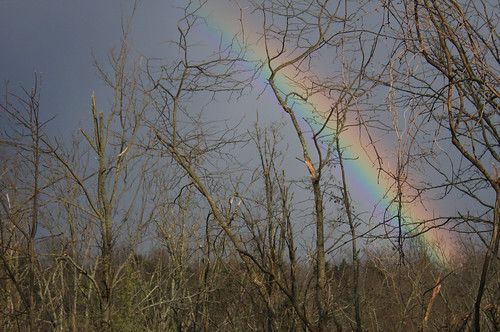
Pleasant surprise after shower during hike, Daniel Boone National Forest. Laurel Co., KY.
(*photo credit)
February 16, 2013 Outdoor Activity as a Remedy for Depression
People know and researchers confirm that those of us who get outside when possible are more able to combat depression that can weigh people down. It is a combination of fresh air, full spectrum sunshine, and the scenic beauty of the great outdoors that can have a therapeutic effect on our mental and spiritual health. We need to touch the soil in some way. This could be through gardening, outdoor chores, physical exercise, or merely sitting or walking and taking in the beautiful landscape all around.
Fresh air and sunshine have an enlightening and softening effect on our nerves. The body responds with a sense of new life coursing through our bones in ways hard to describe. The lungs need oxygen; the body needs Vitamin D that sunlight activates; the soul needs unmarred beauty whether taken in individually through a gracious spirit or shared with kindred spirits.
Gardening has many advantages listed over the years at this website. A communion with Earth herself is part of the beauty that unfolds as we tend growing plants. Now is the time to sow the peas for the first of the spring crops (see February 24, 2012). It is the time to prepare soil for onion bulbs, and tend the growing greenhouse brassica plants while looking for an opportune time to plant them when warmer weather occurs.
Outdoor chores include trimming the grapes, clearing up the vines and saplings from the fence row, pruning the fruit trees when the weather allows, cutting out briars, tending hot beds, obtaining some horse manure for banking herb beds, digging horseradish for Lenten meals, and checking watering systems for any winter storm damage. Outdoor work gives us a sense of progress that creates a more positive outlook. If we achieve little tasks we are better prepared for the big ones later in the growing year.
Physical exercise is often neglected during harsh winter weather when streets and sidewalks are iced over; even outdoor walking, hiking, or jogging is somewhat hazardous. However, when paths are clear, the way is open to take that trek in the great outdoors when we begin to detect the witch hazel and the sprouting wild garlic, and listen to the cooing of the mourning dove.
Sightseeing can also reduce cabin fever or wintry depression. This may occur by auto, bike, bus, boat, plane, or train ride -- or simply by foot. Some with financial resources might add that this is a perfect time for a world tour or to go to Florida. The change in scenes allows our mind to get out of well-worn ruts and start to survey the panorama of new scenes that flood our brains. In a last resort, if we cannot go outside due to immobility, go to the window and watch the birds or other wildlife, or neighborhood pets that come into view. They are a needed change of scenery.
Prayer: Lord, on this first Saturday of Lent, help us find
your glory in the vast outdoors all around.
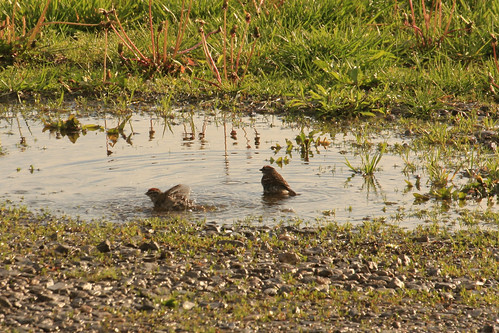
Puddle becomes popular bathing spot for winter birds.
(*photo credit)
February 17, 2013 Temptations Confronting the Earthhealer
No doubt we are all plagued by temptations and so was Jesus. In previous reflections we treated Jesus' temptations in the desert: power (a king in the worldly sense), materials (convert stones to bread), fame (jump off of the Temple's pinnacle). See 3/5/06; 2/10/08; 3/11/09; 2/21/10; 3/13/11; 2/26/12. After saying much on the varieties of temptation and how we are to respond through self-discipline and praying for courage to say "no," we are still left with subtle temptations concerning our Earthhealing mission that can go undetected, or discounted as of little importance. It is not so!
Temptation One: Ensure our credible and secure position. This is the desire to have bread enough to complete the journey, but we live by more than bread alone. Alone, each of us can do very little, and so we strive to be content to let things take their course. However, let us think twice here. Healers may be gentle and meek to victims, but not to culprits. It is not right to let matters be if harm is ongoing. We can also hope that those with differences are not so set in their position that they cannot be persuaded to hear and know where we stand. We must confront those sapping vitality from our Earth -- and go unchecked. Our denunciation and exposure is vital to ultimate healing.
Temptation Two: Work with the Powerful. We are tempted to think that we ought to associate with wealthy and influential people who appear friendly and thus gain their favor. Thus we are tempted to be silent about the current economic system and its many materialistic manifestations. On the other hand, we can delineate differences by showing clearly where we stand. With courage we state that our troubled world is on a non-sustainable path; this is due to a consumer-oriented capitalism in which our globe is immersed, from America and Europe to India and China. The pervasiveness of the current system should not tempt us to be "politically wise" and to join tweakers of a corrupt system. New renewable energy technologies need promotion -- but they are not a total answer. A fundamental economic change must occur.
Temptation Three: Tinker with fame and others will undoubtedly follow. We are tempted to see ourselves as gods who can perform major changes, and so we act as though our power will attract others to our cause. On the other hand, a responding humility is necessary to recognize that spiritual empowerment comes in recognizing that God is in charge. Our cooperative endeavors are performed in an awesome respect for the Resurrection coming alive in us as renewal of Earth unfolds. Our small actions are part of the cooperative venture with the Lord -- and Good news involves inviting others to partake in this venture by sharing resources.
Prayer: Lord, give us the trust in you that we can venture forth even without assurance of sufficient resources; help us speak forthrightly even when lacking popular support; allow us the
satisfaction of doing your will without immediate feedback or fame.

Up, up, UP!
(*photo credit)
February 18, 2013 Ten Ways to Live the Year of Faith
While these ten ways are taken directly from guidelines written by the USCCB "Committee on Evangelization and Catechesis," this is expanded to a broader community of believers:
1. Participate in weekly liturgical worship. Going to Church on a regular basis is an opportunity to encounter Jesus personally, especially through the Eucharist. Our faith is also strengthened through Scriptures, homilies, the Creed, sacred music, and the other liturgical prayers said in common.
2. Confess misdeeds. It is not enough to think we will be better by church attendance alone; we must deepen our quest for perfection in faith by confronting our weaknesses and resolving to improve our personal lives through reconciliation.
3. Learn about the lives of the saints. This couples with our desire to present church history (see February 1, 2013). The saints are a major part of that history -- and we desperately need exemplars in our lives.
4. Read the Bible Daily. Our faith grows as we come closer to the Word of God. We ought to have a habit of picking up the Bible and reading passages each day, or by Scriptural reading through reciting or singing psalms with the praying Church.
5. Read church documents. Serious reading of what worshippers hold is part of that history. For Catholics on the 50th anniversary of Vatican II it means reading those documents. A history of events and persons is to be complemented with a deeper study of documents which are the foundation of our belief.
6. Study the Catechism. Knowing Church beliefs, moral teachings, prayers, and sacraments is important for publicly communicating one's faith. Special study is part of taking the time to grow in faith.
7. Volunteer in the parish. Faith is not like pumping fuel at a filling station. Faith grows through service, for through loving deeds we manifest our deepening faith. Participating in parish activities manifests our desire to be of further service to others.
8. Help those in need. All are asked to share with those with essential needs at this time, and this increases our sensitivity to recognizing those with other needs. Our own salvation rests on our willingness to share with the poor both near and far.
9. Invite a friend to worship services. Our faith is something to be lived and shared with others, especially those with no religious practice and those who have fallen away from practice for one or other reason.
10. Incorporate the Beatitudes into daily life. The beatitudes are found in Matthew 5 and are a blueprint for good Christian living. Their observance can help all to be more patient, humble, generous, loving, forgiving, and sharing. They open the door for an ongoing process of establishing the Kingdom of God -- and we are privileged to be part of this activity.
Prayer: Lord, give us the grace to grow in faith and to be willing to perform the various activities that allow this to take root in our hearts.

Solar light, underneath February snow.
(*photo credit)
February 19, 2013 Let's Popularize Solar System Day
On Solar System Day we learn about the planets of which Earth is one, and how all revolve counterclockwise around our sun. We consider the shortening and lengthening of sunlight spans through the seasons. We become aware of our place in the sun and the sun's place in our lives -- part os which is solar applications. Solar power is not really new, only a renewed interest in all applications natural (photosynthesis, daylight, clothes drying, greenhouse cropping). Solar "systems" are naturally at work, but they are augmented by human applications (heating our homes, generating electricity, pumping water, and recharging batteries). Solar applications can be centrally situated with large-scale electric power generating farms and roofs on large building and parking lots; it can also be highly decentralized as well.
However, the slow rate of price decline (until two years ago) has made this renewable energy source less competitive with other sources such as wind and hydropower (only 3% of dams are tapped), and of course non-renewable fossil fuels coal and natural gas. However with current lower-cost solar panels, overall costs are fast approaching competitive electricity levels. This applies to low-level domestic applications championed in our book 99 Ways to a Simple Lifestyle (Doubleday/ Anchor & University of Indiana Press) four decades ago and in Healing Appalachia (University Press of Kentucky) eight years ago. If all favorably-situated roofing were solarized, half of the domestic energy needs could be met.
Making solar power work best depends on interconnections with local electric grid systems and favorable rates of buying excess energy by utility companies. It is more than simply letting meters run backward for, in fairness, there are utility maintenance costs that need to be considered. On the other hand, electric rates will be impacted by installing and maintaining a costly domestic solar-generating site. Decentralized systems work well when the grid fails in storms, but these also have many problems such as tree limb trimming or removal. When centralized systems fail many unaffected private homes still have their electricity on through their solar units and storage systems.
Solar is here to stay as part of the total energy mix -- the sun does not shine always nor does the wind blow always. The more diverse the mix as far as renewable energy goes, the smoother the operation -- provided hydropower, geothermal, and biofuels are near. However, for the very near future some fossil fuels are needed, and so for production, transport, storage, and ease of application, natural gas (where leakage is minimized) is still the best associated fossil fuel source. Someday a wise mix of renewables and energy efficiency will make the picture less climate change threatening. Solar System Day has broad applications.
Prayer: Lord, teach us to use our resources wisely and to make the best of our brother the sun that gives us free energy to use.

St. Francis in the garden.
(*Photo by R. Racineur, Creative Commons)
February 20, 2013 A Saint for Every Age
Holiness bloomed in every age if we look for them:
0-100 Virgin Mary, Elizabeth, John the Baptist, Paul Apostles, Mary Magdalene, Martyrs of Rome, Luke
100s Ignatius of Antioch, Polycarp, Nereus & Achilleus, Irenaeus, Justin, Perpetua & Felicity
200s Calistus I, Cyprian, Agatha, Lawrence, Cecilia Cosmas & Damian, Sebastian
300s Lucy, Agnes, Blaise, Helen, Anthony, Athanasius, Basil the Great, Monica, Ambrose
400s John Chrysostom, Jerome, Augustine, Patrick, Hilary Genevieve of Paris, Leo the Great, Cyril of Alexandria
500s Colman of Dromore, Bridget of Kildare, John I, Felix I, Benedict, Scholastica, Ita of Killeedy, Gildas
600s Gregory the Great, Columban, Augustine of Canterbury Isidore of Seville, Martin I, Mildred, Cuthbert
700s Odilia, Venerable Bede, Boniface, John Damascene, Walburga, Willibald, Giles, Stephen of Mar Saba
800s Methodius of Constantinople, Meinrad, Ansgar, Cyril & Methodius, Rembert, Edmund, Paschal I
900s Ludmilla, Olga, Wenceslaus, Odo of Cluny, Matilda Romuald, Utrich of Augsburg, Maiolus
1000s Henry, Romuald, Cunegund, Stephen of Hungary, Odilo, Edward the Confessor, Margaret of Scotland, Gertrude, Gregory VII, Stanislaus
1100s Bruno, Anselm of Canterbury, Isodore & Maria, Norbert, Bernard of Clairvaux, Thomas Becket, Hildegard of Bingen
1200s Dominic, Francis of Assisi, Anthony of Padua, Seven Servite Founders, Hedwig, Clare, Albert the Great, Elizabeth of Hungary, Louis IX, Bonaventure, Thomas Aquinas
1300s Nicholas of Tolentino, Alexis Falconieri, Elizabeth of Portugal, Agnes of Montepulciano, Bridget of Sweden, Catherine of Siena, John Nepomucen, Hedwig of Poland
1400s Vincent Ferrer, Rita of Cascia, Joan of Arc, Frances of Rome, Berardine of Siena, John of Capistrano, John of Kanty, Casimir, Nicolas of Flue, Francis of Paola
1500s Catherine of Genoa, John Fisher, Thomas More, Angela Merci, Cajetan, John of God, Francis Xavier, Ignatius Loyola, Teresa of Avila, Charles Borromeo, John of the Cross, Aloysius Gonzaga, Philip Neri, Peter Canisius, Paul Miki
1600s Rose of Lima, Robert Bellarmine, Fidelis of Sigmaringen, Francis de Sales, Josaphat, Martin de Porres, Jane Francis de Chantal, Peter Claver, Vincent de Paul, Kateri Tekakwitha, Margaret Mary Alacoque, Camillus de Lellis
1700s John Bap. de la Salle, Lucy Filippini, Mary Margaret d'Youville, Alphonsus Liguori, Paul of the Cross, Louis de Monfort, Clement Mary Hofbauer, John Baptist Rossi
1800s Joseph Pignelli, Julie Billiart, Elizabeth Ann Seton, Peter Chanel, Andrew Dung-Lac & Vietnamese Martyrs, John Vianney, Herman, John Bosco, Theresa of Child Jesus
1900s Pius X, Michael Pro, Frances Xavier Cabrini, Faustina Kowalska, Maximilian Kolbe, Teresa Benedicta of the Cross, Katharine Drexel, Padre Pio, John XXIII, John Paul II
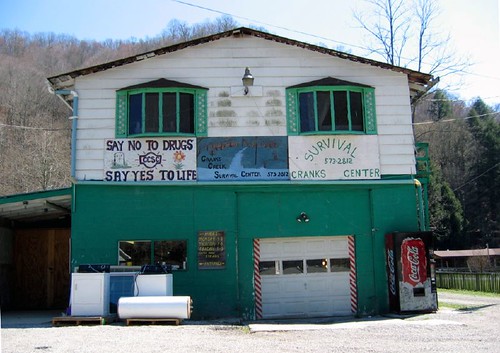
The Cranks Creek Survival Center.
(*photo credit)
February 21, 2013 The Poor Will Rise -- Christian Revolution
The rise of the lowly, the messianic hope of Mary's Magnificat, is a key component of an Earthhealer's goal for saving our threatened Earth. But how can this be done with lack of material resources? I learned much by watching Cranks Creek Survival Center in Harlan County, Kentucky (see April 5, 2007) repair hundreds of homes each year through volunteers; the program was run using disability payments to Becky and Bobbie Simpson (blind through a mining accident) and their family.
This extended clan gives me the theological insight that the poor can do things that can have a ripple effect on a global level. In some ways, Bangladesh is similar to this clan -- a country that is arising. We are convinced that this website can influence a world through a moderately priced Internet site. Is this a hope, a declaration, a challenge, or a combination of all?
Hope underlies all that we do, for without hope we are paralyzed. At first glance, this expectation of change seems insurmountable, but what if we trust in God? Hope moves us forward and does not allow a materialistic status quo to take over and halt all activity. For too long, poor folks harbored the vain wish that they could win a jackpot and become rich so that could be change agents. The rare few who win sweepstakes generally succumb to greed or are captivated by con artists who take their new-found wealth. A spiritually-based hope has a social content, a power resting in a collective "poor" who help each other with Jesus in their midst. Converting one person at a time is good and not to be denied, but we are talking about a hopeful people with the power of God working within them.
Declaration is seeing Magnificat as a definitive prayer/song that tells what is happening now and in days to come. However, this means overturning the status quo and that is Revolution. We must be convinced that in a non-violent and loving manner we are to change the world around us and heal our wounded Earth. The Declaration states what is happening but not the velocity of the process. We are agents of change and catalysts called by the Lord to hasten the day of the Lord's coming. We are called to excite the poor to revolt in a non-violent manner as part of this process.
Challenges stand before us since the powers adhering to the status quo resist change. Here institutionalized religious structures must examine their role critically, for keeping their structures in place may demand surrender to the status quo bent on no profound change. Wealth and privilege stand as barriers to change. Instead, the Church must help overcome resistance and hasten a redistribution of resources in a fair and equitable manner. It is challenged to overcome wealth barriers that generate class differences; their continuation will mean nothing is accomplished. Non-violent revolution is possible.
Prayer: Lord, give us hope that we can rise to the challenge.
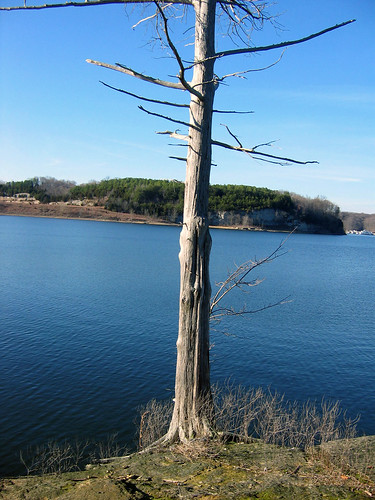
Standing guard over the Green River, KY.
(*photo credit)
February 22, 2013 George Washington and the Federalist Donation
Interestingly, the position of our first President whose birthday is today, is misidentified with current day political positions. Federalists as an emerging party of which Washington belonged could be regarded as "conservative" from the standpoint of finances -- the private domain exploiting the commons for the good of a privileged few; recall that Washington was a wealthy man. However, political positions are fluid over time and so comparisons are somewhat misleading. A federal stance in contrast to a decentralized "states rights" one was a post-Revolutionary War liberal goal -- a federalized central system resulting from joining disparate colonies into a fledgling national union.
The founding fathers' American vision of unity is similar to the current striving of the European Union (EU) to overcome financial difficulties and join into a more perfect union. As Americans we must support the EU struggles, for their ancient nationalistic tendencies to go it alone have a far heavier baggage than that of the youthful American colonies. Shared EU fiscal responsibility is difficult to attain.
Also, a functioning African Union made up of youthful nations that lack democratic practice and working infrastructure has a difficult time. In that continent, new nations formed after the Second World War were not created from coherent tribal territories and ethnic clusters; rather, they resulted from accidentally designed colonial territories from the 1880s carving up of a continent. Some, like Madagascar, are self-contained as islands or ancient kingdoms, but most include divisive tribes.
World federalism looms as a dream due to emerging financial problems related to globalization. The ease of moving unaccounted money from one land to another in an instant transaction leads to shifting of financial resources to less-regulated and lower-taxed mini-states or even American states. This ease of movement causes the bidding war for investment, which tends to omit social and environmental constraints. The tendency is to make needed regulations less onerous; social protection within resource nations is weakened in the competition for investments. A downward spiral results and can only be addressed by nations acting together.
An added ingredient to barriers to federalism is the jealousy of privileged nations like America to even consider surrendering any sovereignty to an emerging "higher power." Here Washington's dream goes awry. Surrendering national controls to a more perfect union benefits all parties and improves mutual security. Fidelity to George Washington and our founding fathers' dream involves pursuit of global federalism as sound fiscal policy with strict regulations that protects environment, taxation, and worker rights.
Prayer: Lord, give America the insight to be truly the "greatest" by surrendering national goals to the security of a
better world; let this be our birthright and donation.
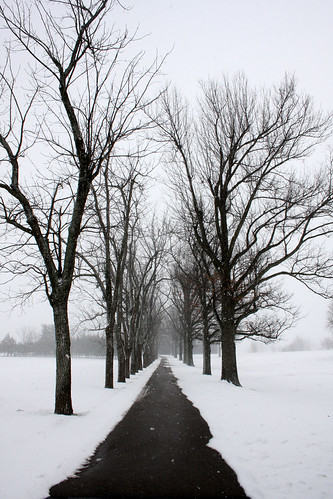
A pathway in the snow. Madison Co., KY.
(*photo credit)
February 23, 2013 Polycarp, Martyr and Saint
The blood of martyrs is the seed of the Church. Tertullian
Reflecting on our major Church leaders is part of the Year of faith. One of these is Saint Polycarp. He was born about thirty years after Christ's death and resurrection. He knew St. John the Evangelist, and became himself the last surviving disciple of the Apostles. About the turn of the first century he was elected bishop of Smyrna in Asia Minor and became a leading Church figure until his death by martyrdom. He was a vocal defender of the Church by speaking out against Marcionism and Gnosticism. For several centuries afterwards, his letter to the Philippians was read in Asia Minor. His defense showed a willingness to combat the numerous heresies among the early Christian communities even amid the eternal danger of outright persecution by the Roman imperial authorities. His writings and actions were immensely influential among other early church leaders such as Irenaeus, bishop of Lyons.
Toward the end of his life at age 80, Polycarp journeyed to Rome to discuss determining the date of Easter; he argued to celebrate this feast on the 14th day of the Jewish month of Nisan on whatever day of the week this might fall. He said this was the custom of the Asian Church with its direct apostolic influence. He did not convince Pope Anicetus who wanted Easter to be celebrated on a Sunday (though every first day of the week was Easter as far as Rome was concerned). Yet these differences did not break their bonds of unity and Polycarp celebrated the Easter liturgy in the Pope's own church. Differences in practice did not separate the church for Polycarp, an early proponent of ecumenism.
Polycarp's martyrdom was triggered by the death of a youth at a pagan festival that was blamed on the "atheists" of which Christians were termed for not worshipping Roman gods. Polycarp refused to deny Christ, and for his steadfast refusal was killed by the sword and his body burnt. However, his Christian disciples quickly gathered his bones as relics "more splendid than gold." They were some of the first public accounts as witnesses to the cult of saints and of relics. Furthermore, at this very early period (at Polycarp's death) the custom was initiated of celebrating a person's feast occurring on the day of his or her death, the day of birth into eternal life.
Martyrdom was to become far more commonplace in the 140 years after Polycarp's death during the major Roman persecutions. Polycarp was in many ways a forerunner of what would happen to Christian leaders who spoke openly down through the centuries. Even to this day and after witnesses in every century (the 20th century being the largest number of martyrs), the testimony of dying for Christ (as Christ died for us) continues to this day. Reference: Lives of the Saints by Richard P. McBrien.
Prayer: Lord, teach us to be witnesses in our lives, for at the moment before death we are called to be Christ's witnesses.
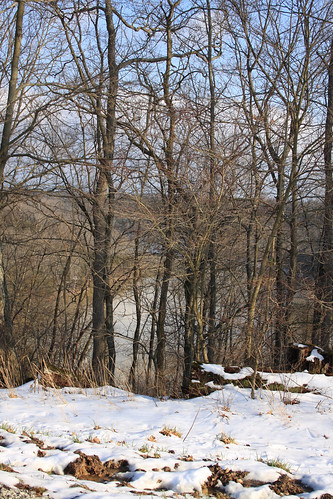
An overlook near the forest's edge. Taylorsville Lake, KY.
(*photo credit)
February 24, 2013 Earthhealing and the Power of Transfiguration
Master, it is wonderful for us to be here. (Luke 9:33)
The words in this quotation from St. Peter after awakening from a trance at the Transfiguration event are quoted along with the afterthought that he did not know what he was saying. In one sense, the words had deeper implications than the mere utterances of a drowsy person. We can repeat at this time of an emerging troubled world that it is wonderful that God has called us to be here at this time in history, in fact, we are blessed to be privileged to serve the Lord today. Do we know what we are saying?
Signs take on significance -- We have before us the Transfiguration, which signifies that what is shown as a fleeting radiance is the preview of eternal glory. We look ahead in Earthhealing to a new and revised glory when what has been ravaged by pollution and resource depletion can become something renewed. It is the promise of the Lily of the Mohawks when her disfigured face during life was transformed into beauty at the time of her passing to the Lord in death.
The Privilege of Serving -- We always need to see that with faith and a dose of good mental and possibly physical health we can be of special service to the Lord. Often people lose hope in what they can do; they throw up their hands and seize allurements, some harmful and others frivolous and consumers of precious time. We are called to help address the dispirited and those drugged or cowed into silence or busy work that makes little sense.
The Promise of Prayer Answered -- The Lord says our prayers are always answered. We can hardly expect to pray for miracles, which are in these times of needed action a hidden desire that we stand back and allow God to perform. Through prayer, we realize our own powerlessness when acting alone or being satisfied as spectators. We, like Peter, are moved through impulse to memorialize brief glimpses of glory. We must be more than mere passive spectators at the Transfiguration, though at times we have our consolations that give us that preview of eternal glory. In the post-resurrection period in which this Gospel narration was written the faithful are transformed by faith into participants.
Faith in Power through Resurrection -- While we are powerless on our own, still with faith in the Lord of power we take on a spiritual empowerment that will transform a wounded world into a healed one. We believe firmly that this is possible as part of Easter hope; we discover that God has more wonderfully empowered us to act in ways we never realized before. We can change the world around us if we believe that God's power can work through us.
Prayer: Lord, inspire us to see that our place on Earth is grace-filled, a moment of opportunity, and a time to focus on what we can do collectively, along with the courage to act here and now
and with all people of good will.

A dandelion, reminder of spring.
(*Photo by Elise Paul)
February 25, 2013 Listing Dandelions' Environmental Benefits
Few people today join us in extending glory to the lowly dandelion (see February 25, 2010), but it is perhaps because many render this noble plant the "junk status" of a weed. Dandelions can be a cornerstone of a simple economy if we see its qualities:
1. No resources human or otherwise are needed to thrive -- Some may regard this as self-evident and it is, but the fact dandelions are so pesky also means that we do not need to spend time cultivating soil, fertilizing or adding pesticides to allow them to grow, or water the plant in dry times. Just allow the dandelion to thrive and it will do the rest.
2. Parts of the plant are nutritious:
* the leaf becomes a nutritious salad with all the freshness of early spring, and works best as a wilted salad with hot oil (bacon grease or vegetable oils) and vinegar, as well as diced boiled potatoes and eggs, and chopped onions;
* the cooked leaf even in summer and autumn involves steeping and pouring off the first batch and using it as a potherb or within meat dishes, stews, and a variety of soups (see 365 Soups) ;
* the root can be dried, crushed, and brewed into a hot beverage at very low cost and as a tasty non-caffeine drink; and
* the bloom can be gathered, fermented and transformed into a golden wine drink that some find refreshing.
3. This is a low-cost replacement for a lawn when one declares it a cover. The persistent greenery of dandelions will challenge neighbors because it requires no water to keep its color; it will demand no fertilizer for virtually any type of soil; it will make no demands on mowing since it will stay approximately the same height. Undoubtedly, objections will come from neighbors who regard it as a weed, and breeze-blown fluffy parachutes of seed as unwelcome invasion of their sovereign space. Okay, city council!
4. This alien from the Old World is naturalized like most other immigrants. Ecologically, many parts of the world ought to welcome this leafy green salad as an added nutritious addition requiring little care or cultivation and thus a welcome friend.
5. This can be a beautiful and uplifting ground cover. Yes, this is really so. Certainly beauty is in the eye of the beholder. I recall a rich carpet of spring greenery in Wisconsin composed entirely of very proliferate and highly endowed dandelions in my springtime stay in that noble state. Often our Kentucky pasturelands come alive in springtime in a mantel of yellow, and this raises my spirits immensely. Yes, I have detected dandelion blooms every month of the year, but the spring color rush and the delicate scent of the bloom always elevates my spirit.
Prayer: Lord, teach us to use the good things of life and to refute the "weeds" status by championing the humble dandelion.

Waterfall. Photo by Warren Brunner.
February 26, 2013 Winter Feelings: Protecting Our Face
We seek to protect ourselves against the harsh winds of winter and so ski masks and other protective gear are common at this time of year. How often do we males think of neglecting to shave -- though that may be a discomfort? Is our facial cultivation to curry favor from those we try to influence? We seek acceptance and so shave in wintertime when every part of ourselves say -- hide your face from the wind. Besides, in some cultures males and especially the elderly are allowed the full beard as a sign of dignity and authority. Maybe it is time to examine this in light of shaving commercials and expectations.
The following continues our practice of promoting the current book, Appalachian Sensations: A Journey through the seasons.
February -- Wearing Whiskers
Fine as oil on the head
running down the beard,
running down Aaron's beard
to the collar of his robes.
(Psalm 133:2)
The gray facial hair of a senior citizen is a magnificent sight, a sign of the autumn of life, an announcement of the cumulated wisdom and courage of one who has lived so long. The offspring take delight in touching those whiskers and beards. It is an elementary sign of respect for elders, seeing values worth imitating, and inquiring of their own experiences before their minds become too confused to tell stories. Elders are the most precious resource of a community, but we neglect to learn their stories in verse or prose by heart as in times past. Audio- and videotapes can capture their exploits before it is too late. Record their memories so that future generations can stay in touch with them.
In the Scriptures, oil is the symbol of life, and the abundant
oil of the elders must be tapped for a people in great need of models and a sense of history. The experiences of elders can
become the precious oil lubricating the creative machinery of
future generations. We must pass on Appalachian traditions, and records of the elders are key to this. Let these photos be part of that undertaking.
---------------------------
Prayer: Lord, teach us that we are to assist others through every way possible. If culture demands that we shave or not to shave, let this reflection be a simple guidepost. Whatever the decisions, help us to see that our goodness and benefits should be more than skin deep.
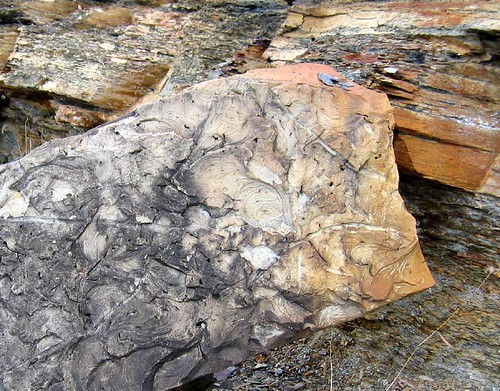
Zoophycus fossils in rocks surrounding Cave Run Lake, KY.
(*photo credit)
February 27, 2013 Fracking: Panacea or Problem
Hydraulic fracturing of shale rock formations to release nature gas supplies is now a commonly-used Fracking process. While this is the first Reflection with this word in the title, the process has been mentioned on May 25th and July 9th of last year. A mixture of water, sand, and chemicals to make the water "slippery" is forced down a drilled hole deep underground in a shale formation; cracks are opened allowing gas to escape. The process is highly profitable; the formations are enormous in scope and found in many countries; and the potential exists to utilize trillions of cubic meters of gas, doubling the known gas reserves in a matter of time since the turn of this century. Our heating gas bill this year will be 40% less than two years ago thanks to fracked gas. Panacea, well not quite, though it sounds great! France and other European nations refuse to utilize the method, while many in the U.S. regard fracking as a road to energy independence. However, that claim may be exaggerated.
Fracking has several emerging problems that have energy experts worried. First, the chemicals used in the fracking process could escape and get into aquifers, though many drilling operators discount this as a major concern due to the depth of the drilling. Ingredients are trade secrets that are revealed to doctors who must treat those affected by fluids, provided they hold this secret.
Second, escaped gas will undoubtedly occur in the drilling operation even with drillers seeking to conserve for the bottom line. By weight, the climate change potential of the escaped gas is two dozen times more potent than the carbon dioxide emitted from burning coal with all its pollutants. Thus, the "cleaner" natural gas combustion method is being questioned. Some have estimated two percent escaping natural gas but that makes it as dirty as coal or oil from a climate change perspective. Others have darkly estimated that it is perhaps on an average (operations vary) up to four percent -- setting off environmental alarm bells. Pessimists say that fracking INCREASES the rate of global warming; optimists call for greater regulation that will solve venting problems. The EPA is completing a study of this problem right now.
However "Welcome to the Golden Age of Fracking" in Acid News (June, 2012) highlights another problem area: the less costly and plentiful supply of natural gas extends the time of fossil fuel dependence and reduces a demand to implement energy efficiencies. Why insulate if gas is cheap? Fracking is not equivalent to the panacea offered by the nuclear power industry after the Second World War as an energy source "too cheap to meter." However, major environmental groups have backed natural gas as the bridge to wean us away from fossil fuels, but doesn't this trade one fossil fuel for another? And climate changes continue at an ever accelerating rate. Attention!
Prayer: Lord, protect us from the overly optimistic when it
comes to the rapidly changing energy picture. Help us be realists.
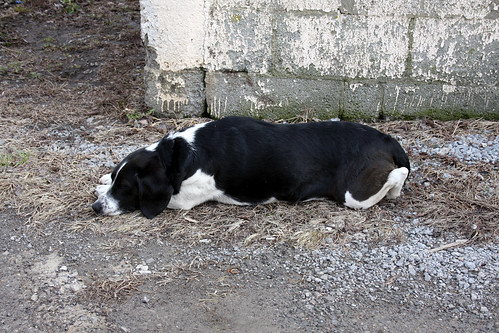
A lazy hound at old country store. Mercer Co., KY.
(*photo credit)
February 28, 2013 Simple Ways to Induce Sleep without Pills
We like to keep our minds sharp, for mental agility is a precious gift from God. There is no guarantee of lifelong sharpness, and so as we age our minds become forgetful and can become dull like a used knife. Part of habitual practice used to retain physical dexterity must be extended to the mind as well. One area may be in trying to fall asleep, though the exercise ought to bring on and not retard sleep. The following are some non-drug approaches as well:
Reading ourselves to sleep -- This is a favorite manner of inducing sleep that is perhaps the most used for people willing to read in bed. I have found it difficult to continue that habit, but do regard it as intellectually stimulating, if you do not want to sleep too fast, and if the reading material is not too dense.
Praying ourselves to sleep -- A salutary habit may include a thoughtful recounting of the day (an "examen") and the things achieved with a word of thanksgiving to God for allowing us the opportunity to do good for and with others. One favorite type of night prayer is praying the rosary. This is a repetitious use of known prayers said in sequence with various mysteries in the life of Christ and Mary as foundations for reflection and meditation. Through the centuries many have found this and other prayers that still do not demand a concentrated meditative state as praying favorites. Another possibility is to pray for various people and allow them to parade past the memory.
Counting ourselves to sleep -- Counting sheep is way too monotonous for most of us and I often doubt whether anyone has ever done this. However, one can count place names (cities, counties, mountains, rivers, capes, cities, military installations, and historic sites for each state attempting to get an average of one per one hundred thousand people per state (you have to know these populations in advance). This means that Delaware has 9 (easy) and California about 375 (difficult for a non-resident). Kentucky, West Virginia, and Virginia are easy for Appalachians due to proximity and familiarity, and Alaska with large land mass and low population is easy for all with a smidgen of geographic knowledge.
A variation on this last theme is to count only cities and towns if you know 3,000 or more, or to count counties (there are a little more than 3,000 of these).
Note: My use of these methods become more infrequent because I fall to sleep too fast and my number of long distance trips has been curtailed, so there's less opportunity to count objects.
Prayer: Lord, you bless us with memory that needs activation and a period of being turned down in sleep. Help us to overcome the sleeplessness of those with a heavy conscience, and to gain the blessing of ease at falling asleep by those with peace of soul. |

